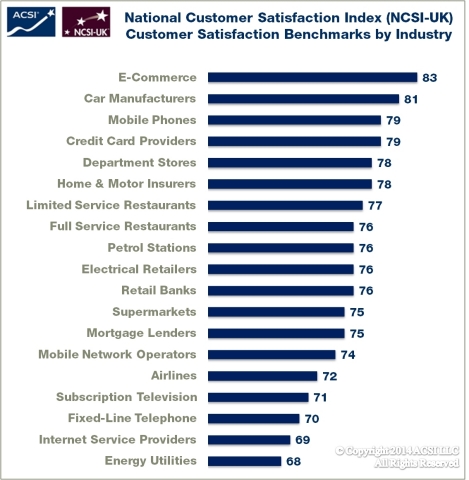LONDON--(BUSINESS WIRE)--The national level of customer satisfaction grew by 0.4 percent in the third quarter of 2014, according to a report released today by the National Customer Satisfaction Index (NCSI-UK). The index is currently 75.7 on a 100-point scale. The latest NCSI-UK report covers financial services including retail banks, credit cards, home and motor insurance, and mortgage lenders.
Retail Banks
One year after the launch of the Current Account Switch Service (CASS), customer satisfaction with banks is up 3 percent to an NCSI score of 76, an all-time high for the industry. Switching remains low relative to other industries, but the process of changing from one bank to another is now less daunting. As a consequence, banks have to compete not only for new customers, but to be able to keep the customers they already have.
“When consumers have more choice, strong customer satisfaction becomes more of a competitive advantage, encouraging companies to provide better service and more innovative products,” says Claes Fornell, ACSI founder and Chairman. “For banks to keep customers, maintaining status quo is no longer good enough.”
Small banks and building societies, which tend to have higher customer satisfaction because of their ability to provide more personalized and customized service, improve 3 percent to an NCSI score of 80, surpassing big banks by a sizeable margin. However, the “Big Four” banks still hold nearly 80 percent of the personal current accounts market, and even with the intensified competition, high barriers to entry and expansion have only begun to erode.
Santander has managed the most dramatic turnaround. Just a few years ago, it ranked last among banks, but an 11 percent improvement for 2014 catapults Santander to a record high NCSI score of 80. Profits are increasing as well, with Santander reporting 26 percent rise for the first three quarters.
Lloyds Banking Group, (including Halifax and Bank of Scotland) advances 5 percent to an NCSI score of 77. None of the other big banks improve, but only HSBC (including First Direct) declines, falling 3 percent to 76. Barclays is unchanged at 74, which is now below industry average. RBS Group remains in last place at 71.
Banks continue to improve their digital channels, and the industry-wide website satisfaction benchmark (84) is highest among all financial services, though scores for individual banks vary widely.
Mortgage Lenders
With interest rates at record lows, customer satisfaction with mortgage lenders is up 3 percent to 75. After years of sitting on the sideline, the major high-street banks are lending to households again. With more products on the market, consumers are benefitting from greater competition and most lenders have better or steady customer satisfaction compared to a year ago.
Nationwide edges up 1 percent to an NCSI score of 80 in its fifth consecutive year of gains. Barclays is unchanged at 76, followed by Lloyds Banking Group at 74. Smaller mortgage lenders and building societies are up 1 percent to match the industry average at 75. RBS Group and Santander each improve by 1 percent to 72, tied for last place.
Credit Cards
Customer satisfaction with credit cards is up 3 percent to 79, highest among financial services. With a growing number of loyalty incentives, smaller issuers and store cards improve most (+4% to 81), regaining a large lead over big banks. Most of the big banks are unchanged, though Lloyds Banking Group inches up 1 percent to tie Barclays at 77. Only RBS Group is down, falling 4 percent to 73.
Home & Motor Insurance
Customer satisfaction with home and motor insurers gain 1 percent to an NCSI score of 78, a seven-year high for the industry. Here too, competition is responsible. The insurance industry is considerably more competitive than most other financial services, and price comparison websites have become a strong force for giving consumers more power to pick and choose.
Among larger insurers, Aviva maintains the lead with a 1 percent advance to 79, the company’s highest score to date. RSA Group (up 1 percent to 78) ties with the average of smaller insurers, while Churchill Group and Direct Line stay at 77, and AXA ranks last at 75.
About NCSI-UK (www.ncsiuk.com)
The National Customer Satisfaction Index (NCSI-UK) is a national economic indicator of customer evaluations of the quality of products and services available to household consumers in the United Kingdom, and is produced by the American Customer Satisfaction Index (ACSI). Results are based on survey data from more than 5,750 customers collected via online panel during Q3 of 2013.
This methodology was developed at the University of Michigan and has been adopted worldwide as a leading macro- and micro-level indicator by universities, governments, and countries including the United States, the United Kingdom, Singapore, Korea, Turkey, South Africa, Malaysia, Colombia, Kuwait, and Saudi Arabia.
According to research from the University of Michigan, customer satisfaction – as measured by the NCSI-UK and ACSI – is directly linked to stock market performance. Companies with high scores on the ACSI and NCSI-UK produce higher stock returns than competitors and greatly outperform market indices.




